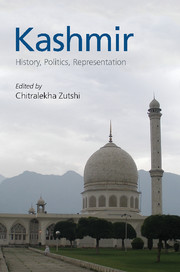Book contents
- Frontmatter
- Dedication
- Contents
- Acknowledgements
- Map 1 Pre-Partition Jammu and Kashmir
- Map 2 Contemporary Kashmir
- Introduction: New Directions in the Study of Kashmir
- PART I HISTORY
- PART II POLITICS
- 5 Azad Kashmir: Integral to India, Integrated into Pakistan, Lacking Integrity as an Autonomous Entity
- 6 ‘Not Part of Kashmir, but of the Kashmir Dispute’: The Political Predicaments of Gilgit-Baltistan
- 7 Law, Gender and Governance in Kashmir
- 8 ‘Survival Is Now Our Politics’: Kashmiri Pandit Community Identity and the Politics of Homeland
- 9 Beyond the ‘Kashmir’ Meta-Narrative: Caste, Identities and the Politics of Conflict in Jammu and Kashmir
- 10 Contested Governance, Competing Nationalisms and Disenchanted Publics: Kashmir beyond Intractability?
- PART III REPRESENTATION
- Contributors
- Index
6 - ‘Not Part of Kashmir, but of the Kashmir Dispute’: The Political Predicaments of Gilgit-Baltistan
from PART II - POLITICS
Published online by Cambridge University Press: 03 August 2019
- Frontmatter
- Dedication
- Contents
- Acknowledgements
- Map 1 Pre-Partition Jammu and Kashmir
- Map 2 Contemporary Kashmir
- Introduction: New Directions in the Study of Kashmir
- PART I HISTORY
- PART II POLITICS
- 5 Azad Kashmir: Integral to India, Integrated into Pakistan, Lacking Integrity as an Autonomous Entity
- 6 ‘Not Part of Kashmir, but of the Kashmir Dispute’: The Political Predicaments of Gilgit-Baltistan
- 7 Law, Gender and Governance in Kashmir
- 8 ‘Survival Is Now Our Politics’: Kashmiri Pandit Community Identity and the Politics of Homeland
- 9 Beyond the ‘Kashmir’ Meta-Narrative: Caste, Identities and the Politics of Conflict in Jammu and Kashmir
- 10 Contested Governance, Competing Nationalisms and Disenchanted Publics: Kashmir beyond Intractability?
- PART III REPRESENTATION
- Contributors
- Index
Summary
Introduction
Indian maps show Gilgit-Baltistan as a part of Jammu and Kashmir – and thereby of India – without giving a hint that this is a representation of claims and not of actual political conditions. According to the Indian position, Gilgit-Baltistan (henceforth GB) is a part of J&K, which has been under the unlawful occupation of Pakistan since 1947. Yet the Indian perspective is strictly contradicted by popular discourse in GB which rejects any pretenses that the area is – or should be considered – part of J&K.
Before partition, sections of present-day GB, a high-mountain area characterized by tremendous cultural, linguistic, religious and political diversity (Sökefeld 2014), were part of the Frontier Territories of the Princely State of J&K, a portion of which formed the British Gilgit Agency. In November 1947, the Gilgit Scouts, a paramilitary troop established by the British, staged a successful revolt against the Maharaja's rule, independently of the uprising that had emerged earlier that year in the southwestern parts of J&K. The Gilgit Scouts asked for accession to Pakistan. While after some hesitation the Government of Pakistan took control by sending a political agent to Gilgit, accession in full legal terms has not been realized even until today. Since 1947, then, the political fate of GB is determined by the condition of being a disputed area under the actual control of Pakistan. We will see, however, that the relationship of some parts of GB with J&K was already controversial and ambivalent before partition, and that the majority of people in Gilgit always resented the Maharaja's rule.
This chapter charts the problematic political relationship between J&K and GB since Gulab Singh's troops invaded parts of GB for the first time in the late 1830s (Huttenback, 1961). Analysis focuses, however, on postcolonial developments and the current situation in the region. Because of its disputed status, the people of GB do not enjoy franchise for the National Assembly of Pakistan. Nationalists of GB argue that the region has a separate political identity and is rightfully neither part of J&K nor of Pakistan. They point out that GB is part of the Kashmir dispute, but not of J&K. At the same time, most people demand the full accession of GB with Pakistan.
- Type
- Chapter
- Information
- KashmirHistory, Politics, Representation, pp. 132 - 149Publisher: Cambridge University PressPrint publication year: 2017
- 3
- Cited by



